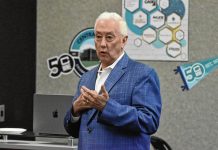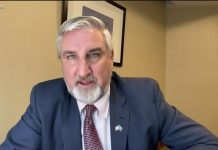INDIANAPOLIS — The Indiana General Assembly voted Monday to override Gov. Eric Holcomb’s veto of Senate Bill 5 dealing with executive powers during health emergencies.
Rep. Ryan Lauer, R-Columbus and Sen. Greg Walker, R-Columbus, both voted to override Holcomb’s veto.
The Republican-dominated House and Senate both easily approved the new law requiring elected county commissioners or city councils to approve any local health orders that are more stringent than statewide directives if the local measures are to take effect. That would include mask mandates now in place for cities including Indianapolis, South Bend, Elkhart and Bloomington since the statewide mask order expired in early April.
The action to override last week’s veto by Republican Gov. Eric Holcomb makes the new law effective immediately. Holcomb said he didn’t want to jeopardize the flexibility of local health officials as work continues to vaccinate more people against COVID-19.
The override came at a time when state health officials say vaccinations are "sluggish," and the state health department announced offering Girl Scout cookies at some vaccination sites as an incentive Monday, including the site at the Indianapolis Motor Speedway. Nearly 40% of Indiana residents ages 16 and older have now been fully vaccinated for COVID-19, state health officials said.
The Indiana Department of Health said about 2.14 million Hoosiers — or 39.3% of Indiana’s roughly 5.3 million residents ages 16 and older — have been fully vaccinated, while 2.44 million first doses of vaccine have been administered statewide. All state residents age 16 and older eligible for COVID-19 vaccines became eligible March 31.
Republican legislators say the proposal is meant to provide a “check and balance” protecting the rights of business owners following complaints about state and local COVID-19 orders closing or limiting businesses that have been imposed over the past year.
The Indiana General Assembly went into session Monday afternoon for the override votes. The Indiana Senate voted 36-10 in favor of overriding Holcomb’s veto. Shortly after the Senate adjourned, without debate, the Indiana House also voted to override Holcomb’s veto with a final tally of 59-30.
During the Senate hearing, Senate Bill 5 sponsor Chris Garten, R-Charlestown, said health officials have been allowed to limit religious worship, as well as decide what stores are opened and what are closed, in some communities. Unchecked decisions by a local health official or officials can result in bankruptcy, business closures, increased mental health problems and potential suicides, Garten said.
Garten was then questioned by several Democrats during an almost two-hour debate. They included Sen. Timothy Lanane D-Muncie, who said allowing public health decisions to be decided by elected officials is a matter of “having the wrong cooks in the kitchen.” Democrats argued appeals and informational sessions will take too much time to get approval from local lawmakers.
One senator said she believed the override shows a divided GOP party at the statehouse.
“I feel like we are in the middle of a Republican Civil War,” said Sen. Jean Breaux, D-Indianapolis, describing Senate Bill 5 as a power grab by GOP lawmakers to reduce Holcomb’s authority.
Sen. Mike Gaskill, R-Indianapolis, vehemently denied Breaux’s allegation about Republican infighting. He also accused Democrats of misrepresenting the motives of those who back Senate Bill 5.
As he said he would last week, Sen. Greg Walker, R-Columbus, voted in favor of the override, maintaining that elected officials bring checks and balance into major decision making.
"When it comes to an enforcement order, that’s when another pair of eyes might be necessary," Walker said. "And that’s only when an enforcement order is challenged in an appeals process. I think we’ll find the language in this bill will stand the test of time."
The bill’s House sponsor — Rep. Matt Lehman, R-Berne — said Indiana has seen examples when health officials have overreached in their authority. He described such overreach as an affront to “churches, businesses and, in some cases, individual freedoms."
State Rep. Ryan Lauer, R-Columbus, voting in favor of the override, said it was one of the easiest votes he’s every made.
While Columbus and Bartholomew County have worked well as a community during the COVID-19 pandemic, "we didn’t see on-the-ground issues that other communities experienced," Lauer said.
“The fact is one un-elected person, regardless of their expertise, should not have the ability to shut down the economy of a community," he said.
After both chambers adjourned on Monday, Holcomb issued the following statement: “As I said last week, Indiana is in an economically enviable position due in large part to the heroic local response to the pandemic that was permitted by a system rewarding speed, collaboration and medical expertise in a time of health emergency. In most cases, the cooperation between local elected officials and local health officials was superb.
"I would have hoped that such sweeping change could wait until we gathered all the relevant experts and stakeholders to strike the right balance regarding local health authority during emergencies and avoid discouraging laudable service in the field of public health, especially knowing that it’s locally elected officials who appoint the local department of health board that hires the local health director in the first place.
"My administration will do just that over the coming months to supply the legislature with up-to-date data before the next regular session," Holcomb said.
Another law about pandemic executive branch powers vetoed by Holcomb this year, House Bill 1123, also was overridden by state lawmakers, but is now being litigated after Holcomb filed a lawsuit stating it is unconstitutional.
Holcomb said House Bill 1123 violates the separation of powers outlined by the Indiana Constitution.
“It states that in an emergency, (lawmakers) have the power to call themselves back into session,” Walker said.
Both chambers voted to override the veto, passing the bill into law without the governor’s signature. Holcomb’s lawsuit lists the Legislative Council — specifically naming House Speaker Todd Huston, R-Fishers, and Senate President Pro Tem Rodric Bray, R-Martinsville — as defendants in the lawsuit.
In a statement after he filed the lawsuit, Holcomb said he took an oath to uphold the Indiana Constitution and he has “an obligation to do so.”
“This filing is about the future of the executive branch and all the governors who will serve long after I’m gone,” Holcomb said.
In the lawsuit, Holcomb alleges “the General Assembly has impermissibly attempted to give itself the ability to call special sessions, thereby usurping a power given exclusively to the governor.”
He adds that Sections 2, 4 and 5 of House Enrolled Act 1123 infringe upon and undermine the constitutional power to call sessions, which is a power the constitution only gives the governor. The lawsuit says these provisions will be disruptive to the state of Indiana.
“HEA 1123’s very existence has created uncertainty and confusion,” the lawsuit states. “This controversy must be resolved as soon as possible or the consequences could be severe, including disruption to Indiana and the proper functioning of state government—something that concerns every Hoosier.”
Sen. Greg Taylor, D-Indianapolis, Senate minority leader, issued a statement after Holcomb filed the lawsuit, saying that while he didn’t agree with all of the governor’s decisions regarding the pandemic over the past year, he thinks it’s better to have one person making the quick decisions during times of crisis.
“House Enrolled Act (HEA) 1123 is an overstep in power by the supermajority in the legislature, and it’s not at all surprising that Governor Holcomb is challenging the constitutionality of this proposal,” Taylor said. “Then, when there are judges speculating about the bill and raising concerns with it before it even makes it out of the General Assembly, you would think that would be enough to get folks to stop and rethink what they’re doing.”
— The Statehouse File and The Associated Press contributed to this story.




